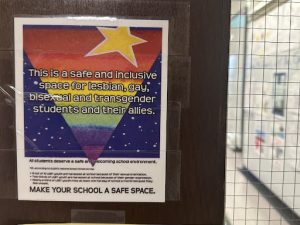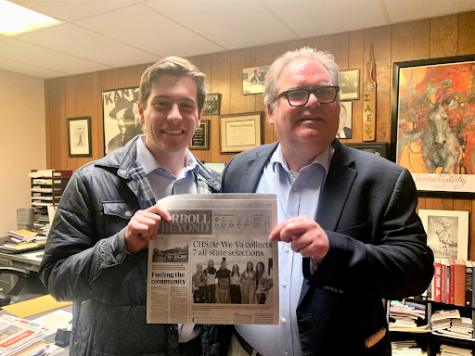Students may play an unwitting role in the prevalence of homophobia here

Perhaps those who don’t think homophobia is a problem here, need to ask themselves some tough questions.
April 18, 2023
A recent TFS poll asked readers how prevalent homophobic behavior is at LFHS. The answers show a clear divide.
Voters were split between 48% who believed it was very common, and 32% who answered that it was rare.
Obviously, homophobia here cannot be both very common and very rare. Perhaps those who think it’s rare should ask themselves: How often do you associate yourself with LGBT+ students, and what do you define as homophobic behavior?
By reframing our perspective on how we perceive homophobia at LFHS, we may notice it is more prevalent than we originally thought.
![]() Loading ...
Loading ...
For as far back as I can remember, many of my closest relationships with other humans have been with members of the queer community. My aunt and godmother, for example, founded an LGBTQIA+ Coalition in Lancaster, PA, and some of my closest friends to this day identify as queer. I personally do not identify as queer, but I have seen a culture of discrimination break and torment the lives of people I hold dear. The amount of times I have silently held a close friend as they wept over a barrage of slurs, an angry rejection, or most recently a gross violation of an important safe space is truly too many to count.
When I joined an athletic team my freshman year, I was put off by the hateful and unintelligible rhetoric espoused for the sake of a joke. “Being bisexual is actually the worst of all the gays,” one player said, “because then you spread the disease.” The f-slur was hurled around more times than I could count. The persistent toxicity became so overwhelming for me as a freshman that I didn’t stay with the team for more than a year.
However, I realize that the purpose of rhetoric like this is not to offend, but rather to entertain. These jokes were not made maliciously, but rather were the result of well-preserved offensive rhetoric in the otherwise well-meaning culture of male-dominated sports. In fact, despite all this, I felt accepted and surrounded by a group of largely good people – so where is the disconnect?
The issue lies in the nature of discrimination: a group that discriminates rarely understands the perspective of the group they ostracize. The reason the poll is so split is that it isn’t really a question. A poll about whether or not homophobic behavior exists in a public high school is comparable to a poll on whether or not birthmarks exist. It doesn’t really matter if you’ve never seen one–they do exist.
This dilemma is essentially the same; it’s not a question of whether or not homophobic behavior exists at LFHS; of course it does. If you deny its existence, then you are part of a group that simply does not associate with members of the LGBT+ community, so how could you possibly know?
The disconnect is not in your intentions, but rather in ignorance. The greatest fallacy is believing that everyone operates under the same beliefs you do. The idea that you could change someone’s identity is foolish, and trying to force someone to conform to your ideals is boundlessly cruel. I truly believe you are not a bad person, even if you have something to gain from answering “rare”, you simply are unwilling to face the consequences of your words.
According to the Trevor Project, queer youth are four times more likely to commit suicide than their peers, and an estimated 1.8 million youth seriously consider suicide every year. If that seems like an extreme number, it’s because it is. The necessity for robust, anonymous, and strong mental health support systems for queer students especially could not be more glaring. Yet despite that, students refuse to come to the support of their peers when an incredibly important safe space is torn apart.
Anyone who would argue that words aren’t violence does not understand the power of words. To say words aren’t violence is a cop-out. Words are a beautiful and shattering force for whatever agenda they are contorted to move. Words have a power mightier than violence.
What is communication other than a way to get someone else to feel, or do something we want? Words have built and torn down nations, how could they not have an effect on another? Those who think the world is too soft, may not understand the power that they have. The right to free speech is an incredibly important right, but you do not understand that right if you don’t recognize its inherent responsibility.
At LFHS, most instances of homophobia are not overt. It could be as simple as mocking the use of alternative pronouns, harsh judgemental stares, and making jokes and offensive statements in the solace of your chosen echo chamber. But it does have an effect.
LFHS mental health support students are available for all students, they are anonymous for everyone because ALL THERAPY IS. That is literally how it works, and dedicating a space to a particularly vulnerable group of students could save more lives than you may think.
Ask yourself what is it you seek to gain by alienating these students? Have you ever had a normal conversation with a queer student? Start by understanding where the disconnect may lie within yourself before you seek to change another.
Do you consider rallies, gender politics, LGBTQ+ rallies, or any expression of gender expression too “attention-seeking”? Consider if you ever posted a picture of yourself with a significant other on Instagram or watched a rom-com. The vast majority of western media in all forms focuses on heteronormative relationships (which are just as wonderful). A joyful heart in any loving relationship yearns to be seen, and queer students are no exception.
Are you unable to understand how someone could feel attraction in a way different than your own? Consider why that must be a prerequisite for your support. Why must you understand everything about another human to give common respect and dignity?
If you are too lost to even consider any form of queer expression anything but immoral? Consider if you have a duty to correct the morality of another. The nature of humanity is to do what we desire, and no one of us will truly change ourselves for the beliefs of another unless extreme measures. This is another example of the great fallacy. There are imminently more harmful forms of “immorality” for you to “correct,” so if you want to, start there. But if not, mind your business.
If it is not any of these things? If you are genuinely curious, why not try respectfully (read: non-threateningly) inquiring with a trusted adult, social worker, or student who is open to discussing such topics. Most humans actually will NOT ostracize someone who seeks to support them.
The truth is, a queer identity is no different from a birthmark; it is unchosen and unchangeable. You can’t eradicate it, and you can’t deny its existence, nor would you want to. Love and expression in all of its forms is a common joy that every human can relate to. Why deem specific groups lesser than? The sanctity of human life is universally important.
I recognize that change does not come easily, even at the individual level. We as a society are brutally unable to accept the necessity of change even when it is right in front of us. If you are willing to take anything away from this, I’d ask you to simply become more aware of the things you say, and more importantly the way you act. Homophobic behaviors do exist, whether or not you deem them legitimate is irrelevant. Even if you fundamentally cannot understand an identity different from your own, all lives deserve to be treated with respect. I’d hope we can all agree on that.









Andy • Apr 24, 2023 at 1:06 pm
thank you so much for this. this past year has been so hard for queer students (like myself) and this perfectly illustrates the experience of being lgbt at this school and how people just flat out ignore it. hopefully this article educates some people
Nova • Apr 22, 2023 at 5:31 pm
I am so thankful I didn’t go to this school. I was originally supposed to go to this school – in fact I went to LBMS. The homophobia even at a smaller feeder school was ridiculous. I now attend CLSHS and have come out at non-binary, polyamorous, and pansexual. I have amazing supports through the school, whereas in the school system I was in before, I was never encouraged – in fact I was discouraged, from exploring my gender identity and sexuality. Homophoboia and all of the anti-LGBTQ+ slurs that got thrown around at my old school hurt me. Even though I was simply questioning, and entirely closeted. I’m here for anyone and everyone from the community that needs support.
Queer Student • Apr 20, 2023 at 11:00 am
This is very well written, and I’m glad that someone from outside the LGBTQ+ community has spoken up as well.
So many people in the comments of previous articles about this subject said that there is no homophobia, that there is no harassment, and that no one is hating queer kids.
Of course, people who are not queer will hear way less homophobia than those who are, because they aren’t the target audience. And even when they do, they may not recognize or know what things can be hurtful, or don’t know how to look for it.
You are completely right, just because people don’t hear it doesn’t mean that it doesn’t happen. People can’t be omnipresent.
Someone just living their life shouldn’t be political fodder, and someone should have the right to exist peacefully and happily, without being mocked, insulted or followed and recorded.